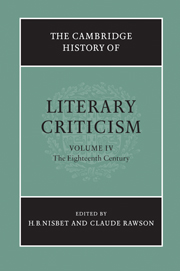Book contents
- Frontmatter
- INTRODUCTION: CRITICISM AND TRADITION
- GENRES
- 3 Poetry, 1660-1740
- 4 Poetry, after 1740
- 5 Drama, 1660-1740
- 6 Drama, after 1740
- 7 Prose fiction: France
- 8 Prose fiction: Great Britain
- 9 Prose fiction: Germany and the Netherlands
- 10 Historiography
- 11 Biography and autobiography
- 12 Criticism and the rise of periodical literature
- LANGUAGE AND STYLE
- THEMES AND MOVEMENTS
- LITERATURE AND OTHER DISCIPLINES
- Bibliography
- Index
- References
9 - Prose fiction: Germany and the Netherlands
from GENRES
Published online by Cambridge University Press: 28 March 2008
- Frontmatter
- INTRODUCTION: CRITICISM AND TRADITION
- GENRES
- 3 Poetry, 1660-1740
- 4 Poetry, after 1740
- 5 Drama, 1660-1740
- 6 Drama, after 1740
- 7 Prose fiction: France
- 8 Prose fiction: Great Britain
- 9 Prose fiction: Germany and the Netherlands
- 10 Historiography
- 11 Biography and autobiography
- 12 Criticism and the rise of periodical literature
- LANGUAGE AND STYLE
- THEMES AND MOVEMENTS
- LITERATURE AND OTHER DISCIPLINES
- Bibliography
- Index
- References
Summary
For practical reasons, the developments in the critical debate about prose fiction in two separate languages are here placed under a single chapter heading. In fact, the differences and resemblances between German and Dutch criticism are no greater or smaller than those between English and French. In all four there is much common ground, originally based on the classical heritage of the European Renaissance, with Latin as its shared language, but subsequently continued through an ever increasing intertraffic of translations between the vernacular languages. Ultimately, it was very much a European debate, with regional, yet sometimes quite significant, differences. The first section will deal with the German-speaking world, the second with the Dutch Republic.
German theory and criticism
In general it can be said that German theorizing about prose fiction in the seventeenth and eighteenth centuries showed greater sophistication than that in England. There are also more treatises written independently of particular specimens of the genre. But until the latter part of the eighteenth century the terms of the debate were similar to those elsewhere. German criticism in the second half of the seventeenth century, then, just like its French and English counterparts, ignored lower and popular forms of contemporary prose fiction and concerned itself with the pastoral and the heroic romance, as practised in Italy, Spain, France and England and reaching Germany in translation. Until the 1680s criticism was aimed at legitimizing these works, and integrating them into a hierarchy of existing genres. In the field of terminology there was to be less confusion than in English, since, as in France, the term Roman was accepted from the beginning and hardly ever questioned as the proper overall generic term.
- Type
- Chapter
- Information
- The Cambridge History of Literary Criticism , pp. 264 - 281Publisher: Cambridge University PressPrint publication year: 1997

